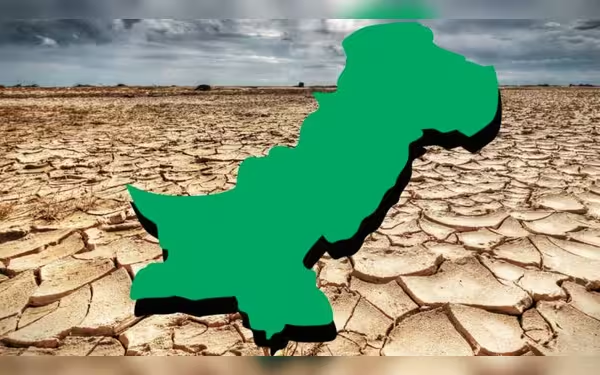Saturday, November 23, 2024 01:58 PM
Pakistan's Climate Change Challenges and Legislative Efforts
- Pakistan contributes only 0.9% to global GHG emissions.
- Parliament's Climate Change Act 2017 lacks effective implementation.
- Urgent action needed to address climate change impacts.
 Image Credits: thefridaytimes
Image Credits: thefridaytimesPakistan faces severe climate change challenges despite low GHG emissions; urgent legislative action is needed for a sustainable future.
Pakistan, despite contributing only 0.9% to global greenhouse gas (GHG) emissions, finds itself among the nations most vulnerable to the impacts of climate change. The alarming rise in global temperatures, which reached 1.48°C above the levels recorded at the end of the 19th century in 2023, has been declared the hottest year on record by the Copernicus Climate Change Service. This increase in temperature has dire consequences for the environment, leading to severe air pollution that poses significant health risks, particularly to the elderly and children.
According to the World Health Organization (WHO), air pollution is a major trigger for various diseases, including heart disease, strokes, lung cancer, and other respiratory illnesses. In response to these challenges, the international community, especially industrialized nations, has set ambitious goals to achieve net-zero emissions by 2050. This aligns with the Paris Agreement of 2016, which emphasizes climate change adaptation, mitigation, and finance.
In Pakistan, the Parliament has taken steps towards environmental sustainability by adopting the Climate Change Act 2017. This act provides a legal framework for climate change policy and establishes two standing committees in the Senate and National Assembly to oversee its implementation. However, the effectiveness of these measures is hindered by a lack of political will and commitment to enforce the provisions of the Act.
The Climate Change Act recommends the formation of the Pakistan Climate Change Council, chaired by the Prime Minister, to oversee the country’s climate action plan. Yet, there is no clear record of whether this council has been established or how often it convenes to discuss pressing environmental issues. Similarly, the Climate Change Authority is tasked with presenting annual reports to Parliament, but the frequency and content of these reports remain unclear.
Moreover, the standing committees in Parliament, which are supposed to provide oversight of the government’s climate policies, have struggled to produce meaningful outcomes due to various factors, including political interference and a lack of commitment from legislative members. As the effects of climate change intensify, it is crucial for Parliament, political parties, and citizens to unite in addressing this pressing issue.
To ensure a sustainable environment, several legislative measures can be proposed. For instance, Pakistan could set a target to achieve zero carbon dioxide emissions from road transport by 2035. Additionally, promoting the use of sustainable aviation fuels and establishing a circular economy could significantly reduce carbon emissions and waste. Implementing carbon pricing on industries that heavily pollute and halting the import of goods that contribute to deforestation are also vital steps.
Furthermore, Parliamentarians should actively represent their constituents' environmental concerns by engaging in debates and calling attention to relevant issues. Learning from international examples, such as the UK’s Climate Change Committee, could provide valuable insights into effective advisory and regulatory mechanisms for climate change policy.
While Pakistan has made some strides in addressing climate change through legislative measures, the real challenge lies in the implementation and political commitment to these initiatives. It is imperative for all stakeholders, including the government, political parties, and citizens, to work collaboratively to safeguard the environment and ensure a sustainable future for generations to come. The right to a clean and healthy environment is not just a legal obligation; it is a fundamental human right that must be upheld.













